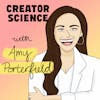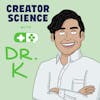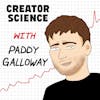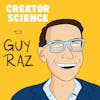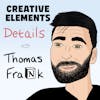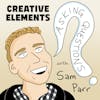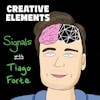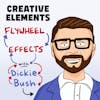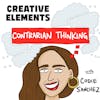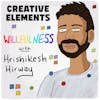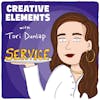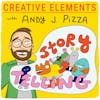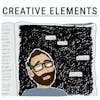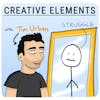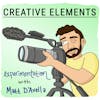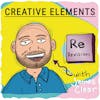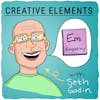![[REPLAY] #8: Adam Turla –Going on tour, building a fanbase, launching albums through kickstarter, and playing cave shows [REPLAY] #8: Adam Turla –Going on tour, building a fanbase, launching albums through kickstarter, and playing cave shows](https://images.podpage.com/https%3A%2F%2Fmegaphone.imgix.net%2Fpodcasts%2F462a8698-3da4-11ec-bb56-d30dedf76dc7%2Fimage%2F8_Adam_Turla.jpg%3Fixlib%3Drails-2.1.2%26max-w%3D3000%26max-h%3D3000%26fit%3Dcrop%26auto%3Dformat%2Ccompress?auto=format%2Ccompress&w=100&s=0f65603dfab1946d14209714e21ebc6b)
[REPLAY] #8: Adam Turla –Going on tour, building a fanbase, launching albums through kickstarter, and playing cave shows
Play EpisodeAdam Turla is the guitarist, lead singer, and founding member of Murder By Death, a five-piece band from Louisville, Kentucky.
Adam Turla is the guitarist, lead singer, and founding member of Murder By Death, a five-piece band from Louisville, Kentucky. They have a unique sound that's somewhere between folk, rock, and spooky western. Even more unique is their cult-like following that has supported them for the last 20 years. In this episode, we’re talking about how Murder By Death has built such a loyal following. We talk about the early days on tour, how they accidentally got lumped in with the Emo movement, why they use Kickstarter, and how Gratitude has allowed them to keep this band going now, 20 years later.
Join the Creative Companion Club 🤫
Follow Creative Elements on Instagram
Full transcript and show notes
***
SPONSORS
***
IF YOU LOVE CREATIVE ELEMENTS
Subscribe to weekly episode emails
Leave a review on Apple Podcasts
***
ABOUT JAY CLOUSE
Subscribe to my newsletter, Creative Companion
***
FOR PODCASTERS
Enroll in my podcasting workshop
Enroll in my course on podcasting, Podcast Like The Pros
***
PODGLOMERATE NETWORK
This show is a part of the Podglomerate network, a company that produces, distributes, and monetizes podcasts. We encourage you to visit the website and sign up for our newsletter for more information about our shows, launches, and events. For more information on how The Podglomerate treats data, please see our Privacy Policy.
Since you're listening to Creative Elements, we'd like to suggest you also try other Podglomerate shows surrounding entrepreneurship, business, and careers like Rocketship.fm and Freelance to Founder.
Learn more about your ad choices. Visit megaphone.fm/adchoices
Jay Clouse 00:00
Hello my friend, we hit a big milestone this week, Creative Elements crossed over 1 million total downloads. In under two years, the show has been downloaded more than a million times, it's insane to think that there are more than 1 million copies of my work on phones all across the world. I'm trying to take some time to soak that in and enjoy that victory. But I also want to take some time to thank you for being part of that journey. I don't take a single listener or a single download for granted. And I want you to know just how much it means to me that you were supporting me as a professional creator. If you haven't already left a rating or review on Apple podcasts or Spotify, please consider taking a minute to do so. I know it doesn't sound like it makes much of a difference but I promise you that it does. I see each of those reviews and they help grow the show a lot as well. I have an exciting announcement coming soon on how I can better support you but that will come in another week or so. But this week, I'm going to re air one of my all time favorite episodes of this podcast. The irony is that this episode is the least downloaded episode of all time. And I think that's an absolute tragedy. It is not indicative of the quality of the episode. Here's the thing, digital creators can learn a ton from musicians, musicians and fine artists are the OG creators. And if we understand their journey to success, even today, I think we learn a lot from it. All the way back in episode eight of the show, I was able to interview Adam Turla, the lead singer of my favorite band, Murder By Death. Yes, I know, Murder By Death sounds like an intense name for like a metal band but I promise it's not intense. It's this beautiful folksy sound. And I've been lucky to see nearly a dozen other shows all across the country. I've seen a handful with Mallory. In fact, we'll be playing a lot of their music at our wedding. This episode was a ton of fun for me to put together in the early days of creating the show. Adam and his record label, Bloodshot Records were kind enough to let me use their music in the episode itself and that allowed me to be more creative. It expand the way that I think about storytelling in this show. It made the episode a whole lot of fun. So in honor of 1 million downloads, I'm excited to share with you one of my favorite episodes of the show, episode number eight with Adam Turla of Murder By Death. And we'll get to that episode, right after this.
Adam Turla 02:24
If we had just like had more success and gone the traditional route, and like had all these, like, strict record contracts that wouldn't let us do this or that, I never would have been able to engage with the fans in the way that we do, I never would have been able to do all these special events and these Kickstarters and all the things that have honestly come to define who this band is.
Jay Clouse 02:45
Welcome to Creative Elements, a show where we talk to your favorite creators and learn what it takes to make a living from your art and creativity. I'm your host, Jay Clouse. Let's start the show. Hello, welcome to another episode of Creative Elements. I'm glad that you're here, and I can't wait to share this one with you. One of the benefits of being a creator is the opportunity to collaborate with other creators that you respect and admire. And in today's episode, I'm collaborating with Adam Turla, the lead singer and founding member of my favorite band, Murder By Death, a five piece indie band from Louisville, Kentucky. Now I know what you're thinking, Murder By Death is an intense name, and believe me, I had the same thought the first time I heard of Murder By Death.
Adam Turla 03:44
Murder By Death is from a silly, really dumb 70s comedy. People think we're like a metal band or something.
Jay Clouse 03:52
That was Adam talking about the origin of the name. Now, the first Murder By Death that song that I heard it's called "You Don't Miss Twice."
04:06
["You Don't Miss Twice" clip]
Jay Clouse 04:32
I was hooked pretty much immediately. Their sound is really unique and pretty hard to describe. It's somewhere between folk, rock, and space western. Here's another one of my favorites called "Lost River."
04:48
["Lost River" clip]
Jay Clouse 05:18
Not too metal, right? But it's not just the music that I love about Murder By Death. And it's not just their music that has brought me to around a dozen of their shows. The band just does things differently. Their last four albums have been released through Kickstarter. With little or no warning, the band will announce to previous Kickstarter backers that they have a new album available for sale. In 2012, their first Kickstarter for their album "Bitter Drink, Bitter Moon" raised $187,000 from around 2600 backers. In 2014, their album "Big Dark Love" raised $278,000 from around 3300 backers. In 2018, "The Other Shore" raised $327,000 from over 4000 backers. And just last week, the band released another Kickstarter that had more than $270,000 as of this recording. That Kickstarter, as of this release, is still open until Thursday, May 14. And when they open a new Kickstarter, they include special perks like the ability to ask the band to cover one of your favorite songs, limited edition vinyls, and special concept shows. I've seen three Murder By Death shows in two different caves, and another three concerts in the Stanley Hotel in Estes Park, Colorado. As a fan, I know how special Murder By Death's fan base is, and it's probably pretty obvious to you at this point, too.
Adam Turla 06:36
I have the groundskeeper at both the cave show and the Stanley Hotel have written me letters, just to compliment our fans for being respectful, and like picking up trash and stuff. I mean, like, what other band has that kind of experience, you know? It's incredible.
Jay Clouse 06:57
So in this episode, we're talking about how Murder By Death has built such a loyal following. We talked about the early days on tour, how they accidentally got lumped in with the emo movement, why they use Kickstarter, and how gratitude has allowed them to keep this band going now 20 years later. I'd love to hear your thoughts on this episode as you listen. You can find me on Twitter or on Instagram @jayclouse. But let's jump in and hear from Adam what it's like hitting their 20 year anniversary this year.
Adam Turla 07:32
It was feeling really good. Um, the tour that we were doing in February and March was the biggest and most successful tour we've ever had in the band. And I really thought that it was going to be like people coming out of the woodworks that maybe just wanted to hear, like only the old stuff or something. And it wasn't that at all. That was like my fear was that like, it would be successful, but like on some sort of, like, on reproducible terms or something. You know how like, if you have a band that did really well, and then they had like one record that everybody cared about, and then it got real slow for them, and then they go on tour playing just that record, and that tour is really huge. But then the next tour is not any good, like that's really common in our industry is to be celebrated temporarily. And that's been a big fear for me as somebody who enjoys what we do. And I don't really want to be part of like the zeitgeist in that way, like I would rather just be there making my art and being able to keep doing it, and, you know, hoping that just people respond to whatever we're working on and then respond to, you know, different albums in different ways. So, I don't know, it feels really good because it, it, it sort of seemed to indicate that it wasn't like that it was just a nostalgia tour or something. And for those that it was, they had still continued to come see us, you know, they hadn't gone away. Um, obviously post pandemic, it's been like a totally different experience. But everything's, everything's disrupted, obviously.
Jay Clouse 09:07
Does 20 years feel like a long time or has it been like it just flashed by?
Adam Turla 09:13
So I'm gonna turn 39 in July, and I've been in the band longer than I haven't been in the band, which is pretty crazy. You know, the majority of my life, and Sara's a year younger than me. So for her, it's even more. I have memories of shows, like deep memories of shows that were 1500, 1600 shows ago or more, and because they're really imprinted, especially I think when you're young, and you just have limited experiences. But I also think back to like, what life was like then and, you know, it does seem a lifetime away.
Jay Clouse 10:36
Yeah.
Adam Turla 10:37
I mean, the second that I check into the modern world we're living in, versus like, my perspective on things in like, 2000, 2001, I mean, I guess there's certain things that seemed familiar. You know, we're sort of living in a propaganda age right now. And like, I do, I mean, I have to say that like when I was writing "Who Will Survive," like, there's a lot of like war propaganda back then, like, it's not totally different. That was sort of the big thing when we first were writing. So it's like, and that made its way into our albums, like war was sort of on everybody's consciousness. And that's what you end up writing about when you're an artist is like, what is, how is this, how is the world around me affecting me and my writing? You know?
Jay Clouse 10:39
When you think back to 19 year old Adam starting the band, did you expect to be sitting here 20 years later in the same band?
Adam Turla 10:48
Absolutely not. We were college students at Indiana University. We all lived in the same dorm. There was a little like house next to the dorm that they would let people do, there was like a big empty room. And you could like book a time to set up a band rehearsal or like a dance recital or tarot readings or you know, like whatever. It was just like community space. And so we just started jamming in there because it was the one place you could do that. And this band started from just a bunch of people jamming. When we first started, it was different members. And the first show we played, I'm the Member left in the band. And then Sarah, our cellist, she, she joined, she was a year younger. So that show, the first one was like the end of my freshman year. And then by October later that year, when I was starting my sophomore year and Sarah was a freshman, we got together what would be the core group of the band to play what was our second show. And we traveled with that group of the same people for like, 500 shows. So we dropped out of college to pursue the band on the advice of a lot of industry people. And it was a huge decision for most of us who were like, actually pretty academically inclined. And then we actually went back while we were writing in Boca Lupo in 2005. We went back to school for a semester because we were trying to decide if we wanted to keep trying. And while we were home, we were being courted by all these record labels, and like we were getting all these like weird presence in the mail. I lived in a 120 square foot apartment at that time that had like a twin bed on top of a two by four like closet.
Jay Clouse 12:36
Wow.
Adam Turla 12:37
And it was like the tiniest, like the kitchen was just big enough to turn around like to turn from to go from the the sink to the stove, which was like the cutest tiniest stove you've ever seen. And the bathroom like the shower didn't have a door because there was no space for the door to open. And I'm getting like four half-gallons of whiskey showing up from record labels who are trying to court us at the time. And we're trying to decide, should we finish up school and then do this, should be dropped back out of school? You know, and we were flying out every weekend to play like college gigs and festivals and one offs and stuff.
Jay Clouse 13:17
What was the moment or what was happening early on that got a whole group of people excited enough to pursue this full time and even have industry people tell you maybe you should consider dropping out and doing this full time? Because I feel like that can't be the normal experience for a college band coming together.
Adam Turla 13:35
The first show we ever played, the five of us, it was sort of this like, it really felt a bit like, like a fateful event looking back on it. And people talked about it that way. And it sort of built a bit of a legend around us. And basically what happened was, we're playing the show, and we used to end every set with this really long, super evil dramatic instrumental that was like, it's called like "Those Who Left and Those Who Stayed," and it's on our first album.
14:16
["Those Who Left and Those Who Stayed" clip]
Adam Turla 14:32
And right at the peak of the drama of the song, the power went out during the concert, and we actually have that recording caught on tape. And we released it like years ago on this like weird, like, B-sides thing we put out called "Skeletons In the Closet." And what it is, is, it wasn't just the power went out in the room, it went out, like for four blocks of campus, and it was out for days. And everybody, because it was like at this crazy peak moment of the song. Everybody started saying that we blew the power out. And we we're like, yeah, yeah, probably not, you know. But, but the timing was incredible. And so it, rumors sort of circulated around campus, and people started like talking more about us. And that was just the thing we would hear a lot when we were younger. And you know, we started doing lots of house shows, I put on like over 50 house shows in our basement. We would always play last because that was the worst spot, because there'll be less people there, because everybody was young and getting drunk. We had a thing where basically, we would do it $5 gets you in and get you a cup. And we would always have kegs. And we would put like two or three touring bands on with one local band at the end, and all the money after paying for the beer would go to the touring bands. And we were actually able to pay pretty damn well because there was like, anywhere from 150 to 300 people coming to these house shows. We ended up having some pretty big bands play down there. Um, the biggest groups that played that like really made it I would say were like My Morning Jacket, Coheed and Cambrio I think they played twice.
Jay Clouse 16:23
Love that band.
Adam Turla 16:24
Motion City Soundtrack played.
Jay Clouse 16:25
Oh man, love that band.
Adam Turla 16:27
There's one more that really blew up though I'm just blanking on. But anyway, and lots of like cool regional bands and like stuff that we were really into at the time that, you know, it was a big deal to us. And because we were just, like, super into like the really like, you know, small label that was just our culture back then. We were deep into, like, local Midwest labels and stuff. So that was a big part of our sort of beginnings, was just putting on house shows. And then all of a sudden, out of town bands started asking us to come play for them. And then we would, you know, play with a band and then meet someone from a local label and maybe like, hey, like, you want to work with us. And we were just getting a lot of positive feedback, I guess. And you know, we're playing these shows where we're getting paid like $40 you know, to go drive to another state. But then we would sell a lot of merch, like we had like one shirt and one CD, and we were selling a lot. And it was just like, man, people are really, they don't know who we are when we show up, but they're leaving buying stuff. And we just had these lines at the merch table, and I'd be selling stuff to people. But like, I remember there was a show once on Long Island in like maybe 2001 or two, where there was 50 people there and we sold 45 CDs.
Jay Clouse 17:47
Wow.
Adam Turla 17:47
And it's just like, something's working, you know. And so even though it was so small time, people seem to like something about what we're doing. And it just felt like, you know, you talked to the other bands, and everybody was sort of excited and watching you and like, reinforcing positivity. And, you know, back then, when we started buzzing, we were getting a lot of like, big talk. People would say a lot of stuff like you're gonna be the next, you're gonna be so big. And none of that ever happened. But we just kept kind of clawing our way to be recognized and to be noticed, and we kept...Ultimately, we just figured out a way to utilize what we do have instead of trying to wait for somebody to give us what we don't have.
Jay Clouse 18:33
After the break, we'll look closer at what it really looks like to be a touring musician. Welcome back to Creative Elements. Adam was just telling us about the beginnings of Murder By Death when they started on campus at Indiana University 20 years ago. When I was just out of college, I actually helped organize house shows similar to what Adam was describing. We had local and touring acts come through our house and sleep on our couch. We even recorded some live sessions which we called Wyandotte Sessions from our living room. During that time, I got to see firsthand what the life of a touring musician was like. And let me tell you, it did not look easy. So I wanted to dig deeper and hear from Adam what the early days look like for them on the road.
Adam Turla 19:51
If you just talked about the original lineup that we had, the first show was October 14, 2000. And Vinson, our keyboardist, left in, I think it was April of 2004. And I think we had played like five or 600 shows by then. And that's not including like days on the road where you don't play a show, you know, or rehearsals or recording or writing an album. You know, it was a absolutely full time thing. When we would go on a long tour back then, it was not uncommon to leave for two to three months without going home at all. We also had never stayed in a hotel for probably the first 600 shows. We would sleep on floors and couches and sometime, we would sleep in the van, we had a loft in the van and we'd sleep on the benches. We would camp. We had five people in the band and we had a $5 a day food budget for the band, which meant that if we got a buyout from the venue that we were playing, which was usually a house show or something, which meant that if they fed us, we would go to an Asian market and buy a thing of pot stickers or ramen, and we would cook it on a Coleman camping stove. So we would go, I remember the big thing then was, we had a lot of vegetarians and we would go to Taco Bell and they had the 89 cent bean burrito and we would just get five of those, you know, and that would be enough. We would basically, we just would eat as cheaply as possible. And I remember even that when we would buy beer, we would we would...We loved to party, like we were party animals back then. And, but there was not money for booze unless somebody gave it to us. But when we did decide to buy booze, we would buy Steel Reserve 24 ounce cans, because Steel Reserve, like I grew up in Detroit and so I like, malt liquor was just like, that's what you drink when you're a kid in Detroit. But Steel Reserve was, at the time, 99 cents for a 24 ounce can, but it's twice the alcohol of a normal beer. So you're literally getting four beers for 99 cents. And like we were, we were like being that economical because we had no money. And, and then, but part of that was that also that we were actually making money on the tour, because it's like, even if you made, you know, $150 in merchant night and $100 to play the show, if you did 25 shows and you played show every day, and your only expense is gas and $5 a day budget for food, the goal is that we would come home from those tours, we all lived in one house, and it was $300 a month per person to pay rent. So the goal was that we could pay rent, and it worked. I mean, like it that was, that was what it was like back then, it was just you're working all the time. And you're hoping for the payoff that people will respond, and then basically, buy your merch, or more people show up someday. But I'll say that, like, you know, we were doing that when we were like, you know, 19 years old. If I had to do that level of roughing it now or even 10 years ago, I don't think we would have lasted more than a tour or two. The youth, the youth was a huge advantage.
Jay Clouse 23:11
When you're talking about five people that are all you know, 19, 20, early 20s, living on this type of lifestyle, is that, is that the love of the work or is that the belief in the outcome at the end? Did you guys have this vision that you we're working towards at the time?
Adam Turla 23:29
I think it's like youthful romance and naivety to, to start. You know, it's the idea that like, you know, you're, you're told your whole life, if you're lucky, that you know, that you should do what you love, if your heart's in it, you'll succeed, just try really hard. You know, you have all these things that you're kind of told as a young person. And I think we were running on that largely. And then when we started getting feedback, that was reinforcing that, we started believing it, too. And I think that it's really exciting at first. I mean, we had played I think something like 46 states before I was 21 years old. You know, not just been to but like played, and that's really wild, you know, I mean, like we, we had tried foods from all over the world and you know, we had a really exotic life as young people. And I mean, we we're so poor, I mean, so poor, and like, I mean, I haven't actually done the math, but like, you know, I think back to like, 2003 and I remember that was the first year that like we filed, taxes, you know, for the band. And like we figured out like what we made, and I think we each made something like $11,000 that year. But if you look back, we played like 180 shows.
Jay Clouse 24:51
11,000 divided by 180 is 61.
Adam Turla 24:54
Okay, that's better than I thought it would be. But $61 a show. That's better than I thought it'd be.
Jay Clouse 25:02
After the break, we'll talk about the band's experience exploring music labels, and earning more than $61 per show, right after this. Welcome back to my conversation with Adam Turla of Murder By Death. After years of touring, the band was starting to make a little bit of money while also getting the attention of some music labels.
Adam Turla 25:24
I think the first one that we worked with in any capacity might have been Team AV, Arbor Variety records it used to be called. And it was out of Champaign Urbana, Illinois. I still talk to that dude whenever we're in the same place. He lived in Europe for a long time after that. But um, uh, Eric saw us play a show with a group called DMS, which is the drummer from American Football's band after American Football just disappeared, like nobody had heard of them. Although it was like, I was so excited about that show because I loved that record when I was like 17. And so he thought, that gig and then he started saying, like, hey, I'd love to work with you. And so I think we put out, back then comps are a big deal. So we had some stuff on a comp and then we did a split EP with Volta Damar, which is another one. What's a comp? What's the comp, really?
Jay Clouse 26:13
Yeah.
Adam Turla 26:14
A compilations CD, or tape. So the idea was that you just have one song from like 15 bands, and it's supposed to be like a way to introduce people to new, to new bands.
Jay Clouse 26:26
OG Spotify playlists.
Adam Turla 26:28
Yeah, basically, except for it was way more like vetted than that, you know, I mean, it was, you know, it's like Eric, the guy whose record label it was, had a certain amount of influence. He's a tastemaker in his community. And so for us to get put on that comp definitely made more people come see us the next time we played Champaign Urbana. It was, it was validation, you know. And and, and it was also like, we're on a comp with this band that is awesome. You know, it's like, oh, Tortoise is on the same comp. That's a band that I like, therefore, I must be in a cool band. You know, like there's, there's a little bit of that like tastemaker stuff. And then um, Eyeball Records out of New Jersey picked this up. We were playing show in Bloomington where we lived at an anarchist bookstore. And a couple days before the show, a friend of ours said hey, my friend's band or friend of a friend's band, Thursday, their show in Indianapolis fell through, can they jump on your bill. And we're like, yeah, we get, we'll just give them our money. Because we would do that for touring bands all the time, because we're just a little local band. It was like our seventh show, you know, so they jumped on the bill. And they were good. Like, I had not heard music like that before, because as Midwesterner in 2001, that was like a really East Coast sound, like there just wasn't a lot of that going around, like the hardcore wasn't big in the Midwest. And then that was a derivation of that. And they were really nice. And after the show, Jeff, the singer, texted me, because we had gotten along well, and he's like, hey, I want to give you an early copy of our new CD. And he came in, he dropped it off our house at like one in the morning on their way out of town. And then that CD would be their album Full Collapse, which one like gold or platinum or something later. And then they started asking us to play opening spots for them as they started to get big. And then he basically convinced Eyeball, who they worked with, to put out our first album. And they gave us 3000 dollars to make an album. And we drove up to Chicago during spring break and recorded an album and mixed it all to tape in six days, and we slept like five hours a night because tape just adds, it just takes forever. And so that was our first album, Like the Exorcist, But More Breakdancing. And we did two albums with Eyeball Records, and then this is when we started getting all these offers, because we had no like contract, we had like a verbal agreement with them, just like a 50/50 type thing. And then, um, so everybody's courting us. And, but the weird thing was that the label that we sort of identified with were not courting us, the ones that we were like, Oh, this is this is our culture. And I think part of that came from opening shows for Thursday and My Chemical Romance, who were on Eyeball Records, who blew up, was the best thing that ever happened to us easily because it put us in front of people, like a couple hundred people every night for the first time. And those bands at the time were huge, but just bands, the size potential for anything coming out of like punk or Indy was very small. And those bands were like the biggest fans ever. But like the biggest show we ever played with them would be like a hometown show to like 700 people. You know, I mean, most shows were like sold out three, 400 people. It just wasn't as big as it is now. Live music is so much bigger and so much more profitable now. But anyway, playing with those bands is the best thing that ever happened to us. But also, for the year that we did those support shows, I think we sort of got lumped into the emo category not musically, but, but association wise. And so a lot of the labels that we thought were like shoo-ins for us, we're like, yeah, we're not going in the emo direction, like well actually did you listen to the music, because we're doing this like weird, spooky Western thing. Because we were like, we associated in our minds, we thought we're doing something like Blackheart Procession, Godspeed You! Black Emperor, um, we were, we were coming from a really different place. And we just got lucky that, that the bands of that genre responded to us and were willing to take a chance on us and take us out. But so that was kind of a weird era because we're getting all these offers, we're like, well, but I don't really know any of these bands because it's not my culture. And we decided to put out the record on our--this is very convoluted, so I'm going to not explain the whole thing. Warner Brothers basically gave us money to use as we saw fit to put out our own record through a program they had. And so we did that for our third album instead of signing like a big record deal, and it just made us feel like we could choose our own path. And then instead of, we were getting offers from like so many big bands at that time to open for them, and we're like, okay, we need to stop opening tours, we need to headline shows to create our thing. And so, for in Boca Lupo, I remember we turned a two month arena tour with Panic! At The Disco to go headline 300 capacity venues on a seven week headliner tour. And, you know, I really think that it was smart to do it. I mean, hindsight, who knows? But like, I think it was hard to do because it was the first time we actually started just doing like, well, what's our thing? What do we do? So we started doing the projections behind us of like the old black and white movies. We started creating, like, what our show was, instead of, we're playing for 30 minutes in front of this band of who knows what genre, because we played every kind of band up to that point. So we started creating our own thing then, and then after that, it was just like, okay, we're taking our show on the road, we're doing our thing.Yeah, basically, except for it was way more like vetted than that, you know, I mean, it was, you know, it's like Eric, the guy whose record label it was had a certain amount of influence. He was a tastemaker, in his community. And so for us to get put on that comp, definitely made more people come see us the next time we played Champaign Urbana, it was it was validation, you know, and and, and it was also like, we're on a comp with this band, that is awesome. You know, it's like, oh, tortoise is on the same comp. That's a band that I like, therefore, I must be in a cool band. You know? Like, there's, there's a little bit of that like tastemaker stuff. And then, um, I bought records out of New Jersey pick this up. We were playing show in Bloomington where we lived and an anarchist bookstore. And a couple days before the show, a friend of ours said, hey, my friends band or friend of a friend's band Thursday, their show in Indianapolis fell through, can they jump on your bill? And we're like, yeah, we will just give them our money. Because we do that for touring bands all the time. Because we're just a little local band. It was like our seventh show, you know. So they jumped on the bill. And they were good. And like I had not heard music like that before. Because as midwesterner in 2001. That was like a really, East Coast sound like there just wasn't a lot of that going around. Like the hardcore wasn't big in the Midwest, kind of, and that was a derivation of that. And they were really nice. And after the show, Jeff, the singer was texted me, because we had gotten along well, and he's like, hey, I want to give you an early copy of our new CD. And he came in, he dropped it off at our house at like one in the morning as on their way out of town. And then that city would be their album full collapse, which was like gold or platinum or something later. And then they started asking us to play opening spots for them as they started to get big. And then he basically convinced the eyeball who they worked with to put out our first album. And they gave us $3,000 To make an album. And we drove up to Chicago during spring break, and recorded an album and mixed it all to tape in six days, and we slept like five hours a night because tape just adds it just takes forever. And so that was our first album like the exorcise but more breakdancing. Then we did two albums with eyeball records. And then that this is when we started getting all these offers, because we didn't know like contract, we had like a verbal agreement with them, like just like a 5050 type thing. And then so everybody's courting us. And But the weird thing was that the label that we sort of identified with allowing, we're not courting us, the ones that we were like, Oh, this is this is our culture. And I think part of that came from opening shows for Thursday and my chemical romance or on eyeball records, who blew up was the best thing that ever happened to us easily because it put us in front of people, like a couple 100 people every night for the first time. And those bands at the time are huge, but just bands, the the size potential for anything coming out of like punk or Indy was very small. And those bands were like the biggest bands ever. But like the biggest show we ever played with them would be like a hometown show to like 700 people, you know, I mean, the most shows were like sold out three 400 people. It just wasn't as big as it is now. Live music is so much bigger and so much more profitable now. But anyway, playing with those bands is the best thing that ever happened to us. But also for the year that we did those support shows. I think we sort of got lumped into the emo category, not musically, but but Association wise. And so a lot of the labels that we thought were like shoo ins for us were like, Yeah, we're not going in the emo direction like well actually did you listen to the music because we're doing this like weird, spooky Western thing, because we were like we associated in our minds we thought we're doing something like black heart procession godspeed you ampere, black emperor. We were we were coming from a really different place. And we just got lucky that the the bands of that genre responded to us and were willing to take a chance on us and take us out. But so that was kind of a weird era. Because we're getting all these offers, we're like, well, but I don't really know any of these bands, because it's not my culture. And we decided to put out the record on our business very convoluted. So I'm going to not explain the whole thing. Warner Brothers basically gave us money to use as we saw fit to put out our own record through a program they had. And so we did that for a third album, instead of signing like a big record deal. And it just made us feel like we could choose our own path. And then instead of we were getting offers from like so many big bands that that time to open for them. And we're like, okay, we need to stop opening tours, we need to headline shows to create our thing. And so for in Boca Lupo, I remember we turned down a two month arena tour with Panic at the Disco to go headline 300 capacity venues on a seven week headliner tour. And, you know, I really think that it was smart to do it. I mean, hindsight, who knows? But like, I think it's hard to do. Because the first time we actually started just doing like, well, what's our thing? What do we do? So we started doing the projections behind us of like the old black and white movies, we started creating, like what our show was, instead of word playing for 30 minutes in front of this band of who knows what genre because we played every kind of band up to that point. So we started creating our own thing then. And then after that, it was just like, okay, we're taking our show on the road, we're doing our thing.
Jay Clouse 32:07
So the band started headlining their own shows and doing their own thing. They really started doing their own thing with their 2012 album, Bitter Drink Bitter Moon, which hit number 76 on the Billboard 200. And that album was the beginning of the band's use of Kickstarter.
Adam Turla 32:23
Yes, so we had put two records out on Vagrant Records out of California. And it was like, up and down experience. I liked the people I worked with. But the deals were just not good for us. And we were like, man, like, we just we were just always broke all the time, basically. And I was just like, I know we have fans because like, I've been putting out our vinyl since 2003. And we were selling a lot of vinyl and I do the mail order, like I mail it with my friend Jay. We've been doing that the whole time, boxing up records and sending them out. And I was gonna, we've been doing pre-sales for every album, and they were like, Oh, cool, we're like directly engaging with people, this is really nice. And Kickstarter came around. And I had never seen a music project. I'd never heard of a band that was known doing one. And I proposed, I wrote one up and I had it all built in the back end. And I proposed it to our manager. And we had decided that we were going to do the record with Bloodshot, and they were going to put it out. But I said hey, the thing is, I want to do the vinyl through this Kickstarter format, I think it's gonna be perfect for our audience. And they were like, okay, that's weird, but we want to work with you, and we get it, but like, the vinyl is your thing. So and, you know, they, they really did hear us, and I appreciate them for that, that, that we knew something about our audience, and that we're like, I don't want to like, put a middleman in and then have to charge more for the album. And then, then they have to pay more for shipping. Like, we've just been doing it this way for a long time, and we do it this way because it keeps the cost down to the buyer, and like I don't, I just don't want to read people and nickel and dime them, you know, and that's a huge part of mine, if we talk about like, the business side of things, huge part of my philosophy is on value and making sure that I'm taking care of the people that are taking care of us. So anyway, we, I proposed the idea and they were like, okay, the only thing is that we want like six months to put this record out. And then what happened next was, so I have this thing just the backend is built out, ready to go. And then Amanda Palmer does her massive like over a million dollar Kickstarter. And I was like, Damn, like she got all this press from it, which I was hoping that we would get, you know because, because I hadn't seen anyone do it and I was like, Oh man, this is, this is a real opportunity for something for people to talk about. And we ended up launching I think like six weeks after hers because we had pushed it back so late. And but the good side was was I saw things that she did that I thought worked and things I thought didn't work. And so I learned from seeing hers, and yeah, and hers is always going to be much bigger than ours because she was more of like a bigger, bigger star than we are, you know, we're way more like culty and she has reached into the mainstream in a better way. But it was really cool to observe it and to see someone do it, and say hey, this does work. And so we did ours and we we're really happy with it and, and we're doing we're currently doing our fourth one now. And it is such a cool way to engage with people and to hear their stories and their connections and to be able to literally thank someone. Someone will be like, hey, I want to add this on to my pledge, how to do that? I just type back, and I've typed some of these phrases thousands of times at this point. I was like, just add, you know, $29 onto your Kickstarter pledge, thank you so much. And like, I'm actually able to thank people, you know, in a way that's like, Yeah, one, I can help you, I'm your customer service rep. And two, I can say, hey, like, I get this, thank you. And also it allows me to make special concessions for people. Somebody wrote me the other day with the Kickstarter was just like, I'm experiencing hardship, but I just wanted to say, I can't support your Kickstarter, but I love you guys. And I was like, send me your address. I'm just sending you a shirt and a poster like, you know, like, I'm sorry, that it sucks right now. And like, if you're not engaged in that way, you don't have those interactions, you know? And it's not like I want to be like, always available. You know, I have privacy and like, you know, personal time, and it's not like I want to always be chatting like that. But I do like being able to do little things and like, talk to people, you know.
Jay Clouse 36:47
Back in 2018, I backed the band's campaign for their album, The Other Shore. And I emailed the band to ask about my vinyl which hadn't arrived yet. And within minutes, I received an answer from Adam over email, and they sent me a new vinyl that day. That's an example to show why I personally back each of the bands projects on Kickstarter, but one of the most unique and compelling aspects to the band's Kickstarters are the private shows that they hold for their backers.
Adam Turla 37:12
We've done seven years of shows at the Stanley Hotel in Estes Park, Colorado. It's the shining hotel. It's where Stephen King stayed, had a dream about hurting his kid, and then decided, was inspired to write The Shining. It's a fameous, one of the most famous haunted sites in America. So we do a show in the concert hall every year, and we do five nights every year. And it sells out like within 24 hours of announcing, and we don't, we don't even say when it's going to go on sale. I just put a post up and say it's on sale, and then it's gone. It's crazy. It is so popular, it's by far the biggest thing we've ever done, and it's really fun. And basically what we do is everybody dresses up. It's got kind of like a 20s vibe. It's just a party. Honestly, it's a holiday party in January. People stay at the hotel or they stay in like Airbnbs nearby, and it's a snowy mountain town. We do a long concert. I go out and talk to the fans with the rest of the band for after the show. We do photos and stuff. There's like a little photo booth for people who dress up. And then we have an after party at the hotel bar, and I have, we've done 27 of these shows now. And I've closed the bar every night, because there's just so many people to talk to. And it's just kind of like a little tradition, and then we added a couple years ago, we have our third year, hopefully happening on Halloween and Devils Night this year. We do a show in the Cumberland Caverns. It's in McMinnville, Tennessee, south of Nashville, you hike down a path to a cave entrance, hike 333 feet down the descent into the cave, and then there's this huge ballroom in the cave. And we play two concerts down there. It is easily the best sounding, most amazing venue I've ever participated in. And like I played a like, a beat up amphitheatre, like an Acropolis type thing in Greece once we've played in Denali during the summer solstice in Alaska. The same year we did the first cave show, we just played Red Rocks. Red Rocks is amazing. This is more amazing. It's crazier.
Jay Clouse 39:27
I love those cave shows. I just went last year with my girlfriend, Mallory. The sound is amazing, and I recommend you try it out for yourself sometime. But in the meantime, here's a short recording from one of my visits that cave.
39:42
[Cumberland Caverns clip]
Adam Turla 40:03
The idea was that like, the Stanley sells out so fast. We wanted to do something that's more of like a summer-fall type event. This is just like, it's awesome. I mean, and there's camping. Last year the camping got rained out.
Jay Clouse 40:19
I was there.
Adam Turla 40:19
I felt so bad.
Jay Clouse 40:20
We escaped.
Adam Turla 40:21
Oh, it was bad man. We were like, we had a hotel room, and I was just like, oh god, I felt so bad.
Jay Clouse 40:28
My girlfriend had just leased a brand new SUV, and we camped in the SUV, we slept in the SUV.
Adam Turla 40:35
Oh my god, man.
Jay Clouse 40:36
And then when it rained that night, we just decided, we said we're going to wake up earlier than anybody else here, and we're gonna get out before this is just all mud.
Adam Turla 40:45
Yep.
Jay Clouse 40:47
We got out, but it was still all mud.
Adam Turla 40:49
I have to say, everybody who wrote me, wears it like a badge of honor. Like everybody I talked to and everybody who wrote me about it was like, that was crazy. Because I mean, if you recall, were you there the first night then when it, when it like, the flash floods?
Jay Clouse 41:03
Yeah, yeah, I came into the cave, we had to wait in the cave of the show to get out.
Adam Turla 41:07
Yeah, we played a longer set so that like, they came up and told us to play for longer so that people wouldn't be encouraged to leave because it was safer to just stay down there while the rain was coming down. And they put those picnic tables across the river that formed in front of the mouth of the caves so that people could crawl over them across. I mean, that was...I love shit like that. Don't get me wrong because I love adventure and excitement. And it's very Murder By Death. But I also obviously freak out.
Jay Clouse 41:35
I want to ask after everything that you've learned over the last 20 years, doing these Kickstarters, doing these concept shows, what have you learned about building a fan base and being able to support your work through your fans in the way that you do?
Adam Turla 41:49
It's all about listening. That's it. The first Kickstarter we did was actually just, I felt like I came up with all these ideas, like I've done all these like business podcasts and stuff, where they're like, how do you engage and make so much money? I'm like, ah, like, they think that I just like, pulled money out of thin air or something. What I did was, we worked our butts off, built a fan base. We, every time we did something outside the box, we made sure that we did it right and that we took care of people. Like you know, make sure everybody gets their order, throwing little goodies, apologize if you screw something up and fix it. Like, it's like constant customer service. When we did the original Kickstarter for Bitter Drink Bitter Moon, those ideas were from fans to some extent, because like one of the things was, we'll cover any song you want. Well, I'd gotten all these emails from people being like, hey, is there any way I could like, get you to cover this song? Or what if I paid you to cover the song? What if, would you play our wedding? Would you play, you know, my, this birthday party? And so we actually were like, Okay, if this is something that people actually want, we'll do a one stop place and put it up, and if this is something that they actually want to buy, let's give them a place to actually request it. Instead of all these like loosey goosey emails, we actually just made a shop out of it. And so we just listen to people. And when people have funny ideas for merch, sometimes I say that's a great idea. We have a new one that we just paid the artist yesterday. I have, I have a dog, Robocop. Yeah, you knew who he was.
43:33
["Everybody Loves Him and His Name Is Robocop" clip]
Adam Turla 43:51
He's ridiculous. He's, uh, he's just like a very energetic, bad boy. And, and I love him to death. Like, and so I've actually had people who just see my personal like Instagram posts or it's like seen him on tour when he's coming, done a few shows with us here and there. And they're like you need to make a Murder By Death Robocop shirt. So I had a great idea, and we hired this like super metal artist that we follow. He does like really like demonic shit, like. And we hired him to do a Murder By Death T shirt that's a picture of my dog, Robocop, as a hellhound. And so, uh, so we're gonna put that out whenever he comes around. The Kickstarter, the numbers look insane. They look so amazing and huge, but there's so many expenses. And like, you have to remember how many people, we actually have six people in the band now. We have crew, two crew that we bring out, probably got another 20 people that work for the band directly, not including all the artists and printers and manufacturers. Like our little world of people that we employ is probably like 100 people. There's a lot of people to pay. And so luckily we don't get much shit for those numbers. It's kind of remarkable, and it's a testament to the fans for not jumping out and on conclusions and thinking that were like rich or, you know, that we have like, that we're sitting on piles of money like a shitty dragons or something. Like, that's definitely not, that's not the case. And like, we work with a lot of people that, you know, that when we can work, it's really cool actually, like this Kickstarter that we're running right now. It's basically like, well, we lost our jobs not because of the pandemic. So we were like, we're just going to sell some stuff earlier than we would sell it normally. And I wasn't sure if peope would jump on it, and they really jumped on it and are really helping out. But what people who are supporting it might not even realize is like, how many people I have paid because they supported it. Like I just hired five artists who have literally written me saying like, you don't have any work, do you, nobody's doing my thing, and I have no income. So I've been able to hire all these people and pay them in advance when they need the money for, for work that can sustain them through this. So, so that's the thing I think like, people don't always picture like a band as like a little like small business, but definitely is. A lot of bands pretend like it's not a business because it's cooler to like, not care about that. And I look the other way. And I say like, no, I'm actually really proud to be a small business. I'm proud to support artists and printers, and, you know, whether it's a manager or venue and like, you know, we like to try to take care of people as well as we can.
Jay Clouse 46:47
What do you think is something people get wrong about the Murder By Death story if they don't look close enough?
Adam Turla 46:54
That's a great question. Um, the band name is the obvious answer to that question. People think we're like a metal band or something. And we've lost so many opportunities, tours, gigs, where we were going to play like a Lollapalooza after party. And then the corporate sponsor bumped us off the bill, and we lost like a bunch of like free corporate money, because the lawyers said that our name is too intense. So that's been sort of frustrating, and I think like, to some extent, it takes a certain kind of person to just get over that if that's not, if they don't listen to any, like heavier music or darker stuff. But I don't care anymore, like we do great. We're very lucky to do what we do. We have the best fans, and everybody says that. I get letters from venues saying your fans are like the best behaved. I can't you know, I have the groundskeeper at both the cave show and the Stanley Hotel have written me letters, just to compliment our fans for being respectful and like picking up trash and stuff. I mean, what other band has that kind of experience? You know? It's incredible. It's the, it's the best. And honestly, it's a, it's a blessing in disguise because if we had just like I had more success and gone the traditional route, and like had all these like strict record contracts that wouldn't let us do this or that, I never would have been able to engage with the fans in the way that we do, I never would have been able to do all these special events and these Kickstarters and all the things that have honestly come to define who this band is.
Jay Clouse 48:45
Probably by this point, you can see why I love that band, Murder By Death so much. You can tell from everything Adam said just how much gratitude he has for his fans, and why the band puts so much effort and doing right by them. And as you can see from their story, it has paid off. You can find the band's current Kickstarter in the show notes if you're interested in joining me at one of their upcoming cave shows. At a minimum, I hope you check out their music. I really think you'll like it. Thanks to Adam for being on the show. Thank you to Emily Clouse for making the artwork for this episode. Thanks to Brian Skeel for mixing this show and also creating our music. Both of them worked really hard to turn this episode around quickly. If you'd like this episode, you can tweet @jayclouse and let me know. And if you really want to say thank you, please leave a review on Apple podcasts. Thanks for listening and I'll talk to you next week.
Most Popular Episodes
New to the show? Check out some of our most popular episodes.






